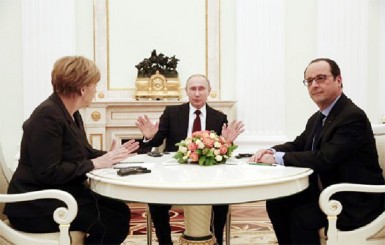(Reuters) – The leaders of France and Germany flew out of Moscow in the dead of night after five hours of talks with Vladimir Putin on Friday, with little to announce to end fighting in Ukraine beyond a promise to keep talking.
None of the leaders spoke publicly after the meeting, which ended around midnight with President Francois Hollande and Chancellor Angela Merkel whisked straight from the Kremlin back to the airport.
The French and German leaders had held similar late talks the night before with Ukrainian President Petro Poroshenko, part of a last-ditch push for a breakthrough before EU leaders consider new financial sanctions against Russia next week.
European officials had played down expectations ahead of the Moscow talks, expressing doubt that Putin would compromise while pro-Russian rebels are advancing on the ground.
Afterwards, Moscow and Berlin both described a commitment to work on a “possible joint document” on restoring a collapsed peace deal signed last September in Minsk, Belarus. The document would include ideas proposed by the leaders of France, Germany, Russia and Ukraine, who would all speak in a conference call tomorrow.

But there was no public word of any agreement on the crucial issue of whether rebels would withdraw from territory they have seized since last year’s truce collapsed.
In a sign of the tense atmosphere, the French and German leaders had gone straight into the Kremlin for the talks without the usual diplomatic niceties of a welcoming handshake for the cameras. They emerged only for a stiff photo opportunity.
On the ground, a brief truce was organized on Friday so trapped civilians could reach safety from Debaltseve, a government-held railway hub nearly encircled by rebel forces who have made it the target of their advance.
Both sides sent convoys of buses, giving residents a choice to evacuate to government or rebel territory. The government buses left full; the rebel buses left mostly empty.
“The last two weeks were hell,” said Artem Nikishin, 31, boarding a bus to the government-held town of Slaviansk with his wife and two sons. “This is our property now,” he said, pointing to several bags and a parcel wrapped in a blanket.
U.S. ARMS
The West accuses Russia of backing an advance in recent weeks by rebels fighting for territory Putin has called “New Russia”, which scuppered the ceasefire agreed last September, reviving a conflict that has killed more than 5,000 people.
Moscow denies it is involved.
This week, Washington has begun openly hinting it could arm Ukraine’s military. That has exposed a potential rift with its main European allies, which argue the move would backfire, by escalating the conflict without giving Ukraine the means to win.
U.S. General Philip Breedlove, the top military commander in NATO, implied that he favored sending weapons, telling a security conference in Munich that the West should use “all the tools in the toolbag”.
But German Defense Minister Ursula von der Leyen told the same conference: “Are we sure that we would be improving the situation for the people in Ukraine by delivering weapons? Are we really sure that Ukraine can win against the Russian military machine?”









